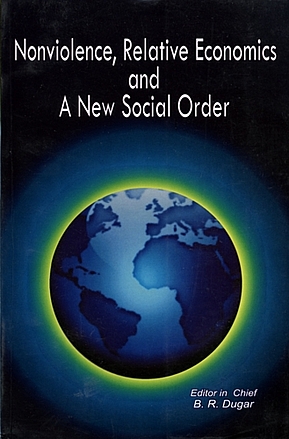*Originally printed in Gandhi Theory and Practice:
Social Impact and Contemporary Relevance, 1969.
The most crucial question with regard to non-violence is the question of defence. Can a nation defend its possession against external aggression or even internal disruption by means of nonviolence? Gandhi had his own views regarding this question, and I shall try to present them in as brief a manner as possible.
The first point to remember is that Gandhi was not a "nationalist" in the usual sense of the term. He thought that the whole human family had a right to the wealth created anywhere in the earth by Nature. And if a human community developed that wealth by means of its own labours, even then the wealth had j be shared by it with the rest of the human family. They could act only as its "trustees". That is why, in 1925, he said in course of a speech:
"I want the freedom of my country so that other countries may learn something from free country, so that the resources of my country might be utilized for the benefit of mankind... a country has to be free in order that it may die, if necessary, for the benefit of the world. My love, therefore, of nationalism, or my idea of nationalism, is that my country may be free so that the human races may live". He said again in 1931: "There is no limit to extending our services to our neighbours across State-made frontiers. God never made those frontiers." This, as everyone will realize, is an ideal which is very far from the usual ideal of nationalism.
It was Gandhi's belief moreover that every kind of possession could not be defended by means of non-violence. Anything gained by violence could be protected by violence alone. So, if a community wanted to protect its talk to the people on the other side, even allow themselves to be killed, but who would not lift even their little finger in order to hurt the so-called antagonist. The antagonist had to be won over by patience; he should be made to feel that his life was not ever in danger. Only, the satyagrahis were determined to put up with any punishment for the defence of a way of life which they considered to be just or moral.
It was often argued against Gandhi that, in modern warfare, such a self-sacrifice on the part of the satyagrahis would not even be noticed. Bombs might be hurled from the air; tanks might sweep over the satyagrahis-, and their slaughter would be useless. Gadhi held however that, after all, the armed forces would have to take possession of the land of the satyagrahis, even if it were to bend them down to slavery. And then would come the second step. The population must organize non-violent non-cooperation with the occupation-forces. There must be no scorched-earth policy; but the population must bravely confront the aggressor, talk to them, tell them that they were prepared to share whatever they had if the soldiers were prepared to share in building up a new kind of life based on justice and equality which they had so long been trying to. But the satyagrahis would never submit to their dictates, or work as their slaves.
It was Gandhi's hope that the sacrifice of the first line of satyagrahis of those who had lain down their lives while not resisting, would give a kind of courage to the survivors behind them, so that they would be able to continue their non-violent non-cooperation.
In time, the imagination of the occupational forces would be touched. They would begin to wonder at the quiet courage and determination of those who never threatened their lives, yet would not surrender, but carry on another way of life in which all men are treated as brothers.
The question was asked of Gandhi if he thought that such a form of non-violent resistance was at all humanly possible. He said it was. But he admitted that it required a quality of courage which was of a very high order. But his belief was that, unless humanity was prepared to accept an extremely audacious measure of this kind, men will be involved for ever in a race for armaments which would lead them to greater and greater moral degeneration.
Someone asked him, again, if it was possible for a satyagrahi to make an appeal to the heart of a man like Bachchaisakao or Hitler. Gandhi replied, that through bitter experience, he would admit that the heart of such a person might not after all be touched. But commanders of war do not act alone. They act through ordinary soldiers, who, as men, are no better and no worse than any of us. The satyagrahVs action will have an appeal for them. And the moment the latter begin to think, the spell of their commander's indoctrination would be broken, and the latter would become isolated. And this kind isolation of the focal points of violence would be the maximum that he would dare to hope for under the present circumstances.
It was in this manner that Gandhi planned to organize the defence of our non-violence possessions by means of satyagraha.
 Dr. Bachh Raj Dugar
Dr. Bachh Raj Dugar
 Nirmal Kumar Bose
Nirmal Kumar Bose

